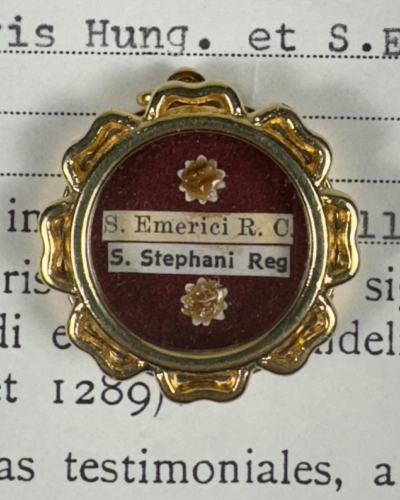King Saint Stephen (†1038) was the first King of Hungary. Although both his parents were baptized, he was the first in his family to become a devout Christian. He unified the Carpathian Basinn in a series of wars against semi-independent tribes and protected the independence of his kingdom by forcing the invading troops of the Holy Roman Emperor Conrad II to withdraw from Hungary in 1030. He encouraged the spread of Christianity by meting out severe punishments for ignoring Christian customs. Hungary enjoyed a lasting period of peace during his reign and became a preferred route for pilgrims and merchants traveling between Western Europe, the Holy Land, and Constantinople. He was buried in his new basilica, built in Székesfehérvár and dedicated to the Holy Virgin. He was canonized by Pope Gregory VII in 1083, together with his son, Emeric. In Hungary, his feast day is also a public holiday commemorating the foundation of the state, known as State Foundation Day. He is a Patron saint of Hungary, kings, masons, stonecutters, stonemasons, and bricklayers, and a Holy Protector against child death. He is venerated in Eastern Orthodox and Roman Catholic Churches, and his feast day is celebrated in Hungary on 16 August (in Hungary - 20 August) and on 30 May (his Holy Dexter in Hungary).
Prince Saint Emeric (also Emericus, Emerick, Emery, Emory)(†1031) was the son of King Stephen I of Hungary and Giselle of Bavaria. At age 24, Emeric was killed by a boar while hunting. He was buried in the Székesfehérvár Basilica. Several wondrous healings and conversions happened at his grave, so on 5 November 1083, King Ladislaus I unearthed Emeric's bones in a large ceremony, and Emeric was canonized for his pious life and purity along with his father and Bishop Gerard of Csanád by Pope Gregory VII. He is venerated in Eastern Orthodox and Roman Catholic Churches, and his feast day is celebrated in Hungary on November 5 and on September 4 (the translation of his relics).









 Поменять язык на русский
Поменять язык на русский 